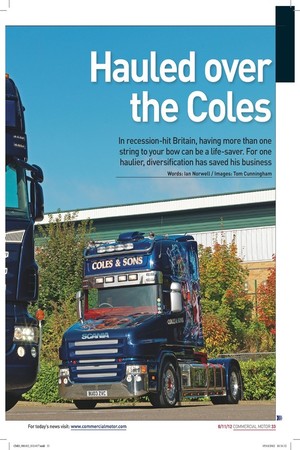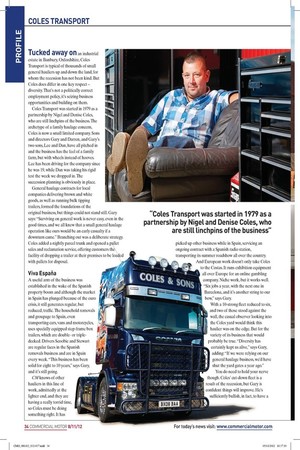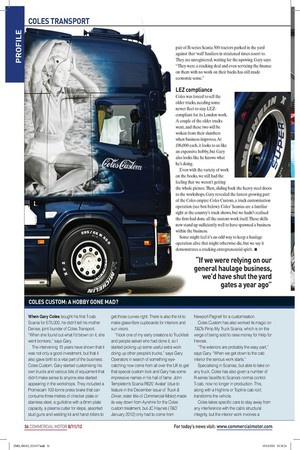Hauled over the Coles
Page 23

Page 24

Page 26

If you've noticed an error in this article please click here to report it so we can fix it.
In recession-hit Britain, having more than one string to your bow can be a life-saver. For one haulier, diversification has saved his business
Words: Ian Norwell / Images: Tom Cunningham
Tucked away on an industrial estate in Banbury, Oxfordshire, Coles Transport is typical of thousands of small general hauliers up and down the land, for whom the recession has not been kind. But Coles does differ in one key respect – diversity. That’s not a politically correct employment policy, it’s seizing business opportunities and building on them.
Coles Transport was started in 1979 as a partnership by Nigel and Denise Coles, who are still linchpins of the business. The archetype of a family haulage concern, Coles is now a small limited company. Sons and directors Gary and Darren, and Gary’s two sons, Lee and Dan, have all pitched in and the business has the feel of a family farm, but with wheels instead of hooves.
Lee has been driving for the company since he was 19, while Dan was taking his rigid test the week we dropped in. The succession planning is obviously in place.
General haulage contracts for local companies delivering brown and white goods, as well as running bulk tipping trailers, formed the foundations of the original business, but things could not stand still. Gary says: “Surviving on general work is never easy, even in the good times, and we all knew that a small general haulage operation like ours would be an early casualty if a downturn came.” Branching out was a deliberate strategy.
Coles added a nightly parcel trunk and opened a pallet sales and reclamation service, offering customers the facility of dropping a trailer at their premises to be loaded with pallets for disposal.
Viva España
A useful arm of the business was established in the wake of the Spanish property boom and although the market in Spain has plunged because of the euro crisis, it still generates regular, but reduced, traffic. The household removals and groupage to Spain, even transporting cars, vans and motorcycles, uses specially equipped step-frame box trailers, which are doubleor tripledecked. Drivers Scoobie and Stewart are regular faces in the Spanish removals business and are in Spain every week. “This business has been solid for eight to 10 years,” says Gary, and it’s still going.
CM knows of other hauliers in this line of work, admittedly at the lighter end, and they are having a really torrid time, so Coles must be doing something right. It has picked up other business while in Spain, servicing an ongoing contract with a Spanish radio station, transporting its summer roadshow all over the country.
And European work doesn’t only take Coles to the Costas. It runs exhibition equipment all over Europe for an online gambling company. Niche work, but it works well. “Six jobs a year, with the next one in Barcelona, and it’s another string to our bow,” says Gary.
With a 10-strong fleet reduced to six, and two of those stood against the wall, the casual observer looking into the Coles yard would think this haulier was on the edge. But for the variety of its business that would probably be true. “Diversity has certainly kept us alive,” says Gary, adding: “If we were relying on our general haulage business, we’d have shut the yard gates a year ago.” You do need to hold your nerve though. Coles’ cut-down fleet is a result of the recession, but Gary is confident things will improve. He’s sufficiently bullish, in fact, to have a pair of R-series Scania 500 tractors parked in the yard against that ‘wall’ hauliers in straitened times resort to. They are unregistered, waiting for the upswing. Gary says: “They were a cracking deal and even servicing the finance on them with no work on their backs has still made economic sense.”
LEZ compliance
Coles was forced to sell the older trucks, needing some newer fleet to stay LEZcompliant for its London work. A couple of the older trucks went, and these two will be woken from their slumbers when business improves. At £96,000 each, it looks to us like an expensive hobby, but Gary also looks like he knows what he’s doing.
Even with the variety of work on the books, we still had the feeling that we weren’t getting the whole picture. Then, sliding back the heavy steel doors to the workshops, Gary revealed the fastest-growing part of the Coles empire: Coles Custom, a truck customisation operation (see box below). Coles’ Scanias are a familiar sight at the country’s truck shows, but we hadn’t realised the firm had done all the custom work itself. These skills now stand up sufficiently well to have spawned a business within the business.
Some might feel it’s an odd way to keep a haulage operation alive that might otherwise die, but we say it demonstrates a cracking entrepreneurial spirit. ■









































